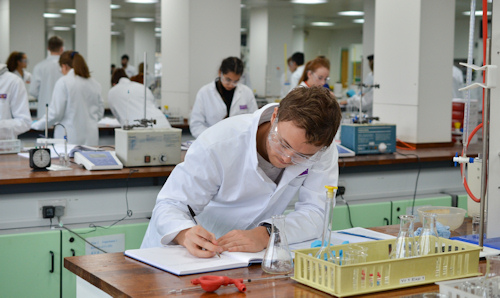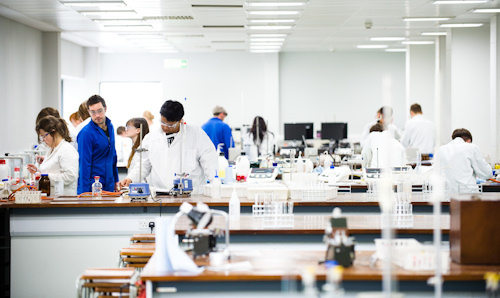
Inorganic chemistry
Our researchers
Inorganic chemistry at Manchester covers a multidisciplinary array of research topics in molecular chemistry, materials chemistry, and radiochemistry across the entire Periodic Table.
Particular research strengths include:
- molecular and environmental chemistry of the lanthanides and actinides;
- molecular magnetism;
- homo- and heterogeneous catalysis mediated by novel transition metal and main group catalysts;
- bioinorganic chemistry;
- the application of advanced spectroscopic and magnetic techniques to probe the electronic structure of metal complexes;
- supramolecular capsules and functional porous materials.
Examples of our different areas of expertise are listed below.
d and f-block electronic structure
Floriana Tuna's interests lie in the study of the electronic structure and magnetism of d and f-block complexes, using principally EPR spectroscopy and magnetometry.
Lanthanide and actinide complexes
The Liddle group investigates the synthesis, structure, bonding, magnetism, and reactivity of lanthanide and actinide complexes, with a focus on species containing metal-ligand multiple bonds, metal-metal bonds, and small molecule activations in catalysis.
The Mills group synthesises metal complexes, predominantly rare earth and actinide, targeting unusual shapes and bonding motifs to control electronic structures and maximise optical, magnetic, catalytic and quantum properties.
The Goodwin group uses coordination chemistry to push both the high- and low-oxidation state limits in rare earth and actinide ions towards a better fundamental understanding of their electronic structures, bonding, and reactivities.
Molecular and electronic structure of coordination complexes
David Collison is co-Director of the EPSRC National Research Facility for EPR spectroscopy, and investigates the molecular and electronic structure of metal ions and radicals in chemistry, materials, biology and medicine, with an emphasis on the use of EPR spectroscopy.
Molecular magnetism and quantum information
McInnes is co-Director of the EPSRC National Research Facility for EPR spectroscopy. His interests are in EPR of inorganic materials, and molecular magnetism.
Porous materials
Sihai Yang researches the development of novel, functional porous materials for applications in catalysis, biomass utilisation, energy storage, separations and conductivity.
Protein stabilising
Using supramolecular chemistry, Imogen Riddell develops novel encapsulation methods to stabilise proteins and probe how biomolecules interact with synthetic constructs.
Radionuclide microbial transformations
Francis Livens investigates microbial transformations of radionuclides and mineral surface reactions.
The Natrajan Group investigates microbial transformations of radionuclides, as well as new spectroscopic techniques for finger-printing actinide ion speciation in solution.



